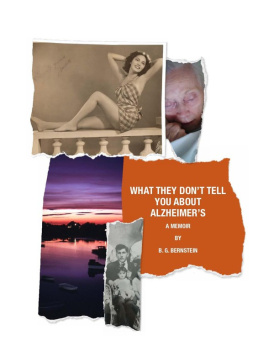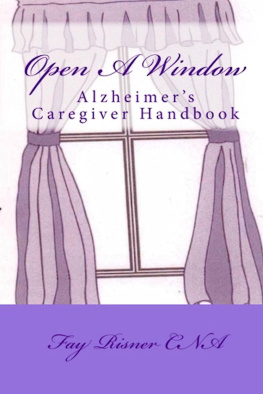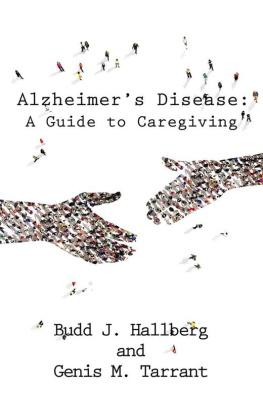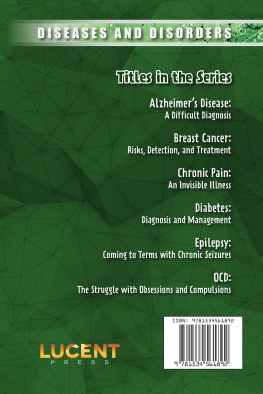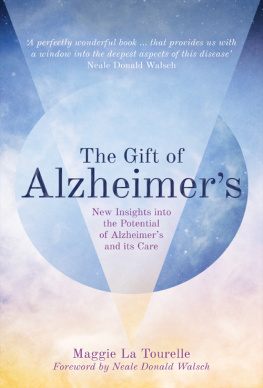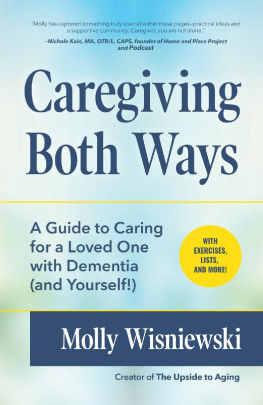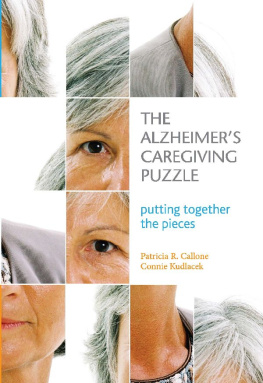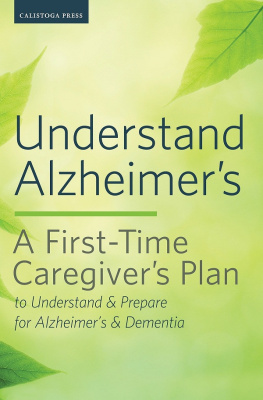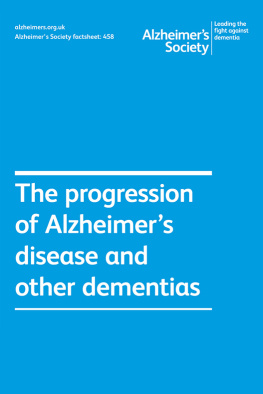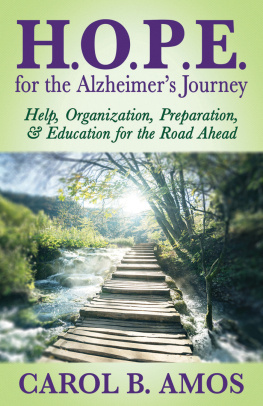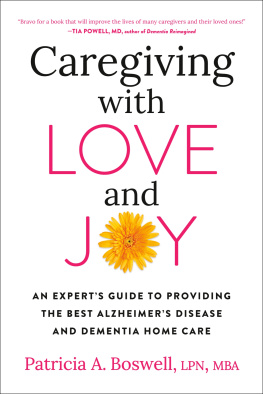Contents
What They Dont Tell You About Alzheimers
a memoir
by
B.G. Bernstein
Riverfront Press
Maine
ISBN-13: 978-1468181487
ISBN-10: 1468181483
www.alzheimersmemoir.com
See the Website for additional book details and information on Alzheimers Disease.
All Rights Reserved
Robert B.G. Bernstein
Riverfront Press and Riverfront Media.
Copyright January 2012
For my parents.
Preface
It was my dad who got me into boats, starting with a few fishing trips to Lake Arrowhead in Southern California. It was there, on the shores of a peaceful mountain lake in the middle of San Bernardino National Forest, he dropped an anchor on my foot. I was only five or six years old. My pinky toe still cranes off at an angle.
Later, when I was a little older, my dad took my brother and me fishing on the reservoirs and rivers in upstate New York. We fished with salmon eggs and all sorts of other baits now banned from the sport. He was patient and caring, reaching for the little jar of brine, taking out a salmon egg as if it were a magic bean, placing it carefully on a tiny gold colored hook at the end of my line. If I think about it hard enough, I can smell his tackle box. I can hear the quiet rumble of his old 5-1/2 horsepower Evinrude, smell its sweet blue-white exhaust.
He taught me how to cast, how to troll, and how to tie a knot. In my tackle box, I carry the last of his old bass lures and even some of his spinners. I never really use them. But they're with me. Sometimes, when I go fishing on a lake, which isn't too often these days, I take one of the old lures and fasten it to the end of my line. While my fishing buddy, John, motors us from one spot to another, I stare at the old lure and think about my dad, how he used to sit in the stern, one hand on the tiller of the Evinrude, the other holding his fishing rod. I remember how he used to stare at the rod tip and hold a bight of the line with his forefinger, ever so gentle.
In 1983 I left a good-paying job in professional fundraising to become a dive charter operator on the coast of Maine. I'm not sure my dad ever really understood what I was doing. While he respected and admired me, was incredibly proud of me, and loved me, he never said what he really felt... that he wanted me to be someone else, for my sake.
Few kids really get that, the feeling their father or mother truly respects them or admires them. I had that. It's a rare thing. My dad, I believe, felt the same way about my brother, now a surgical radiologist. How lucky were we to have a Dad who admired us for doing the things he felt he could not do himself?
And yet, I always knew he wanted me to be someone else. He never really accepted my leaving the city and that job.
My dad died in 1997. I wish I had told him how much I admired him, how much I respected him. How proud of him I was. I never found the time, or made the effort. Although, I believe, at the end, he knew how much I loved him.
During the last two hours of his life, I massaged his entire body. He was unable to speak at the time, dying of cancer, on morphine, but he touched my forearms and gazed into my eyes while I rubbed him down. I kept going like that as long as I could, praying my effort would drain him of life, ease his pain. I massaged him so he could die.
The end came about a half hour after I collapsed on the bed next to his. The hospice nurse woke me, said it was time, that he was taking his last few breaths. I got my brother and my mother; we gathered by his bedside.
The actual dying part was a mechanical thing. My dad, the part we loved, was gone before his body took its last breath.
There were no epiphanies. No revelations. Those would come later, in dribs and drabs. A conversation. A note from a friend of the family. An old photograph. An old letter.
It would be trite and an insult to his memory to say I hope he's fishing some quiet pond somewhere in the afterlife, pursuing the ever elusive quarry of his dreams. It's an insult because he was much bigger than that. He was bigger than the things he loved to do.... His was a selfless life... spent more for the benefit of others.
He never got the boat he always wanted, a 28' Bertram. He never got the cabin on the lake he always wanted in New England. He never got to see his oldest son achieve the greatness he envisioned for him.
But on his last night, during the final two hours of his life, I believe he realized everything would be just fine, if not exactly the way he had wanted it. He left this Earth as he lived his life, thinking of others. In fact, I believe the only thing he ever did just for himself was allow himself to die.
At the time, watching my father die was the hardest thing I ever had to do. Ten years later, my wifes youngest son, Daniel, died of a drug overdose at the age of twenty-one. In an instant the pain of watching my father die was trumped. I thought nothing could be worse than this poor kids sad and untimely death and what it did to Sandra and her extended family.
Clearly, Daniels loss, and in general, the loss of any child, is a parents worst nightmare. Preface this with the long term suffering of a deteriorating disease and the experience of losing a child becomes even more painful and tragic.
In a sense, this is what a child goes through when a parent succumbs to Alzheimers. Its the reverse -- a childs worst nightmare. With Alzheimers, the parent becomes the child, and then something less, much, much less: a cruel amalgamation of child and adult, a vesicle of fear and doubt and confusion and sometimes terrible pain, with no future, no recourse and no ability to alter its destiny.
True, nothing in my life hurt as much as Daniels loss. However, I think I can honestly say, of an equal rank was watching my mother die of Alzheimers.
1. When My Father Died
This is a story about my mother. To tell it, I have to go back to 1994, when my father was first diagnosed with pancreatic cancer. Fortunately, for him, the symptoms of the disease manifested early. This is actually a good thing when it comes to cancer of the pancreas, because it gives a person options and a chance to go on the offensive. You have choices, surgery, chemo, and time to build up your mental fortitude. Some people who learn they have pancreatic cancer find out only after the disease has spread. These people usually get a few months. My father got three years and even managed to write a book while recovering from surgery and undergoing chemotherapy.
When my father first got sick it was pretty straight forward. He started peeing orange. The diagnosis came back in only a few days. Pancreatic cancer. We all went with him to the hospital to discuss what would happen next, survival rates, his treatment, etc. He decided on a course of moderate chemo and chose to get the Whipple operation, where they remove the pancreas, the gall bladder, a group of adjacent tissue containing lymph nodes and possibly a few other things. What they took out isnt really as important as what prompted my fathers decision. He chose the Whipple because he wanted the tumor out and he figured surgery was a good shot at increasing his survival time. And he chose the less drastic chemo because he wanted to keep his hair. He was in his seventies and still had a good head of hair. Call it vain if you want. I call it pragmatic. He knew he was going to die anyway. Why not look good doing it?
That last sentiment might sound cavalier and even callous to some people reading this. I assure you, at the time, there was nothing cavalier about it. A decision had to be made, and my dad weighed his options and made his choice.
He took his last breath in his own bed on December 10, 1997, at about one in the morning, with me, my brother, my mother and a hospice nurse at his side. After he had passed, we all went our separate ways in the house. My brother went to his room. My mother went downstairs. And I went into the master bedroom with my dads wallet. That wallet had a certain smell and a certain texture that I can remember as clearly as anything else I have ever know in my life. Its right up there with the smell of fresh cut grass and the taste of a snowflake on a cold winters day.

